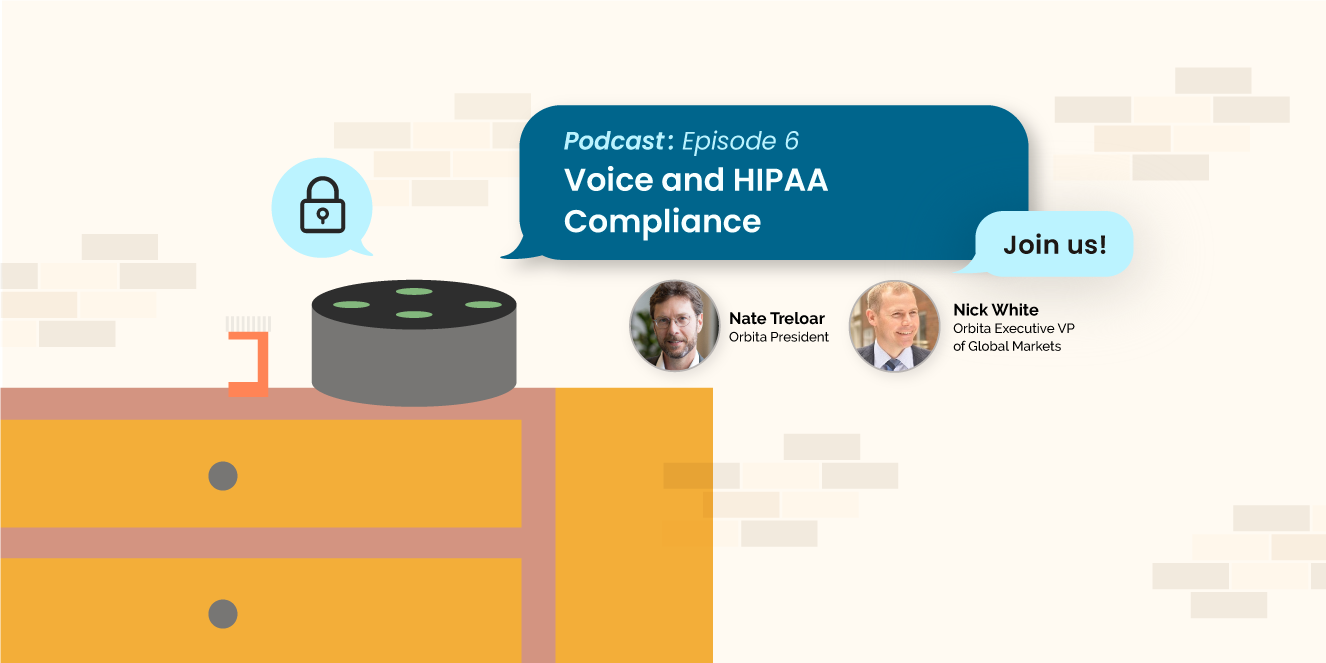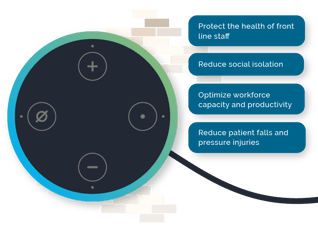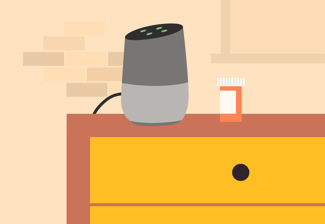
The Evolution of HIPAA-Compliant Voice Technology in Digital Health Tools
“Extending care beyond the boundaries of our traditional healthcare institutions with voice technology is going to be absolutely fundamental to the success of the future of patient care.” -Nick White in Episode 6 of Conversations with Orbita
Artificial intelligence (AI) voice technology has opened an entirely new dimension of virtual interactions to enhance the patient experience and streamline healthcare operations. The evolution of voice-enabled tools has transformed the opportunities and expectations of digital engagements across industries, particularly healthcare.
While for many years, voice interfaces only existed in the realm of science fiction, it wasn’t until late 2014, with the introduction of Amazon’s Echo (Alexa), a voice-controlled speaker, that the potential of voice technology became accessible in our lifetime. Since then, the speech and voice recognition market has exploded, and we expect it to reach USD 21.5 billion by 2024.
Healthcare immediately became an opportunity area for innovation with voice technology, but there always have been concerns surrounding data privacy and security. Many developers began experimenting with voice and its clinical applications to produce skills to support consumers; however, the inability to carry protected health information (PHI) persisted.
“These initial applications, let’s call non-personalized informational types, we’re able to answer general questions about health and wellness topics, but the real power that has developed over time is personalization that meets the needs of each particular patient.” -Nate Treloar in Episode 6 of Conversations with Orbita
The introduction of HIPAA-eligible Alexa skills for consumer devices in 2019 quelled some of these concerns. It enabled covered entities to deploy skills to consumer devices that capture and converse on PHI with the required protections in place. At this point, healthcare providers could extend voice-based capabilities into the home for services such as remote patient monitoring and the scheduling of appointments. However, healthcare providers saw the opportunity to go further, with interest reignited for in-facility clinical applications for voice such as at the bedside, the operating theatre, and even the supply closet.
In conjunction with HIPAA-eligible skills, advancements in machine learning and natural language processing deliver personalized support to patients and lower barriers to accessing care. The evolution from a straightforward interface of essential question answering services to an intelligent, contextually aware voice assistant offers new possibilities for clinical efficiencies and patient engagement to healthcare organizations.
 In 2018, OrbitaASSIST, the world’s first voice-enabled virtual assistant supporting hands-free communication for patients and care teams, was successfully piloted in the Prince of Wales Hospital Spinal Injuries Unit in Australia. The ability to digest context and tailor support based on the patient’s unique request launched the patient experience beyond general button-driven experiences to automated delegation in-hospital workflows and personalized patient support.
In 2018, OrbitaASSIST, the world’s first voice-enabled virtual assistant supporting hands-free communication for patients and care teams, was successfully piloted in the Prince of Wales Hospital Spinal Injuries Unit in Australia. The ability to digest context and tailor support based on the patient’s unique request launched the patient experience beyond general button-driven experiences to automated delegation in-hospital workflows and personalized patient support.
Feedback on this pilot from patients indicated that 100% of the patients surveyed would want the ASSIST solution available during future hospital stays. Subsequent pilots have shown significant impacts on reported falls, with Burwood Hospital in New Zealand reporting a 34% decline in falls based on year-on-year analysis. This transformational solution is now available to U.S. healthcare providers as well.
This global expansion of voice-enabled technology into health systems continues to be an incredible asset throughout the COVID-19 outbreak for numerous reasons. This care at distance model has been brought to life by HIPAA-compliant voice technologies that offer enhanced access and ease to patient and provider experiences.
In the hospital, these devices allow physicians to look up information vocally without needing to type or touch any surfaces, which reduces personal protective equipment (PPE) and cultivates a more sanitary environment. In homes, smart speakers and other devices allow patients to access COVID-19 information, resources and schedule appointments. From the increased usage of these tools, there is an unprecedented awareness of the power and potential for voice to reach patients outside of traditional clinical settings. 
The possible applications of voice in environments where there are HIPAA-compliant devices are significant, and advancements in this technology will revolutionize the healthcare experience for all entities. For example, sentiment analysis (which began with the ability to understand whether someone was leaning towards a yes or no) is now progressing to a state where it can determine whether the user is upset, in a hurry, engaged with the digital experience, and more. Multilingual features are also developing rapidly and opening many more digital doors for patients.
At Orbita, we continue to apply the latest technology trends to our virtual assistants to engage patients comprehensively. We strive to provide intuitive, natural language experiences that emphasize voice, text, and touch to enhance the patient journey. As society slowly begins to return to some semblance of “normal,” voice-enabled technology will remain a vital component in multimodal digital solutions.
“The ability for voice technology to start to bridge the gap of information and accessibility delivers a brand new and enhanced healthcare experience for patients.” -Nick White in Episode 6 of Conversations with Orbita

